Overview
Stem cell transplant for lymphoma has shown promising results, significantly improving patient survival rates. The 5-year relative survival rate for Hodgkin lymphoma is about 87%, and for non-Hodgkin lymphoma, it ranges from 73% to 90%. Stem cell transplants are particularly effective in relapsed or refractory cases, with autologous transplants leading to long-term remission in 50-60% of relapsed Hodgkin lymphoma patients and allogeneic transplants having success rates as high as 70%.
Dr. Pradeep Mahajan, a renowned expert in regenerative medicine, has significantly advanced the field of stem cell therapy for lymphoma. His research and clinical innovations have improved treatment protocols and patient outcomes. Dr. Mahajan’s work highlights the potential of stem cell transplants to extend survival and enhance the quality of life for lymphoma patients. His contributions offer new hope, emphasizing the transformative impact of this therapy in the fight against lymphoma.
Symptoms
Lymphoma usually presents with very general symptoms, making it hard to spot. Still, you can look out for the following signs as an indicator of lymphoma:
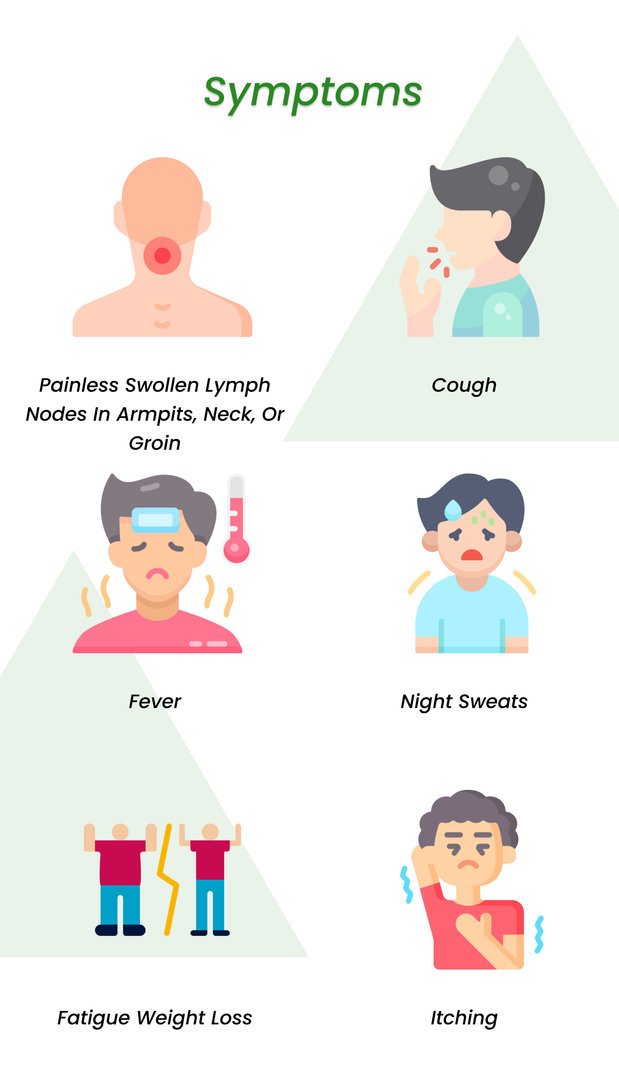
Do you know about the symptoms? Your health is too important to ignore – schedule your appointment now for a thorough evaluation and personalized care.
Types
There are over sixty types of lymphoma that have been discovered so far. However, the two most common types are:
- Hodgkin Lymphoma (HL): Characterized by the presence of Reed-Sternberg cells. It is more treatable and often affects younger adults.
- Non-Hodgkin Lymphoma (NHL): A diverse group of lymphatic cancers that can occur in B-cells and T-cells. It’s more common and can be more aggressive.
Stem Cell Transplant for Lymphoma
Now that we have a basic understanding of lymphoma, are you ready to learn more about stem cell therapy for lymphoma?
Let us start with knowing a little bit more about stem cells.
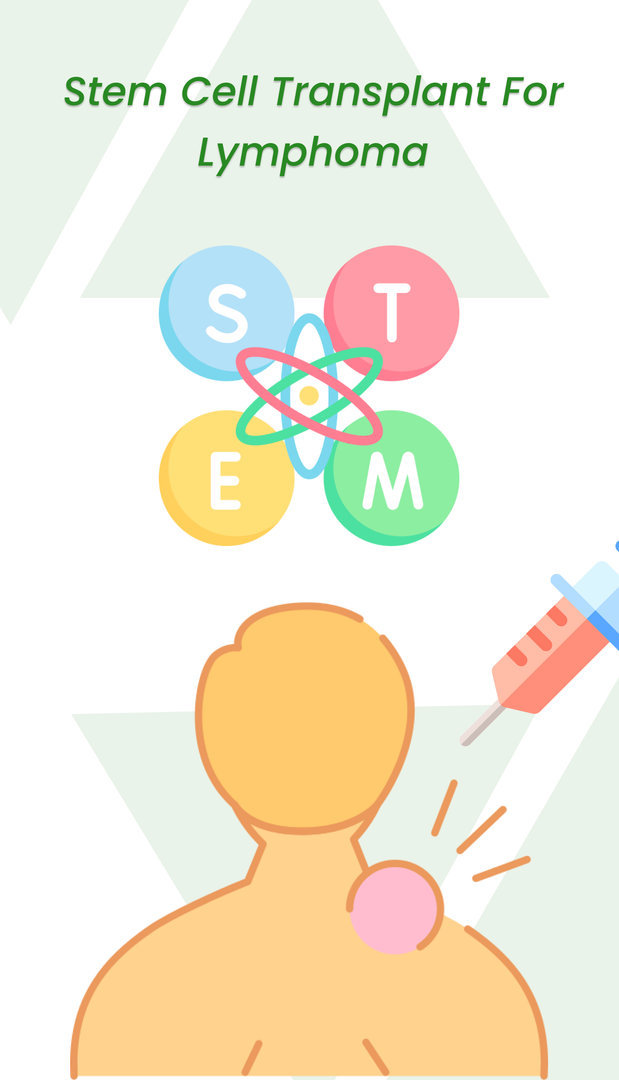
Stem cells are immature cells found in our bodies that can differentiate into any cell.
They are found in our bone marrow, certain fatty tissue, and even in our circulating blood. Immature blood cells are exclusively found in our bone marrow. The patient’s stem cells can be used for treatment, or donor cells might be used.
But how do stem cells treat lymphoma?
Stem cells can differentiate into new lymphocytes after the cancer cells have been killed.
Clinical trials for lymphoma stem cell transplant have been going on for a decade, and the results are promising.
The number of patients getting stem cell transplant lymphoma is rapidly growing as doctors acknowledge its efficacy. Of course, we have to remember that this treatment is still undergoing clinical trials.
While FDA approval has been received for using stem cells derived from umbilical cords, bone-marrow-derived stem cells have yet to receive it. That being said, all legitimate clinical trials are carried out with FDA oversight.
Can Stem Cells Cure Lymphoma?
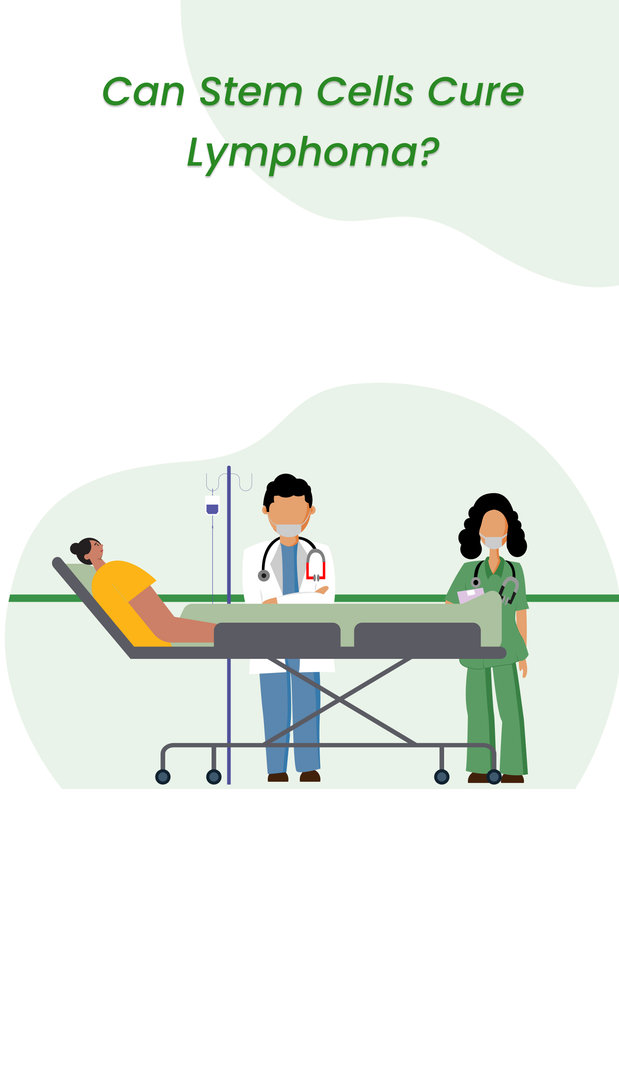
This is certainly a loaded question. Unfortunately, lymphoma can’t be cured. Patients go into remission, which means they do not have active cancer cells in their bodies.
Stem cell lymphoma does this effectively, which means most patients receiving this treatment go into remission for several years.
Which Type of Stem Cells Are Used for Curing Lymphoma?
Depending on the severity of the cancer, stem cells might be harvested from the patient, or a donor might be found.
An autologous transplant is where the patient’s stem cells are used. They are harvested from the bone marrow of the hip bone. This is the preferred type of stem cell to be used.
An analogous or allogeneic transplant is when donor cells are used. The donor could be a close family member or an unrelated person. However, the tissue type of the patient and donor also need to match. This type of stem cell is less commonly used.
But how exactly do stem cells work in treating lymphoma?
You see, stem cells have hematopoietic properties. Simply put, they are capable of forming new blood cells. Not just this, they can also repair worn-out and damaged lymphocytes.
This repair and regeneration mechanism treats lymphoma and prevents a relapse.
Benefits and Risks of Stem Cell Transplant for Lymphoma
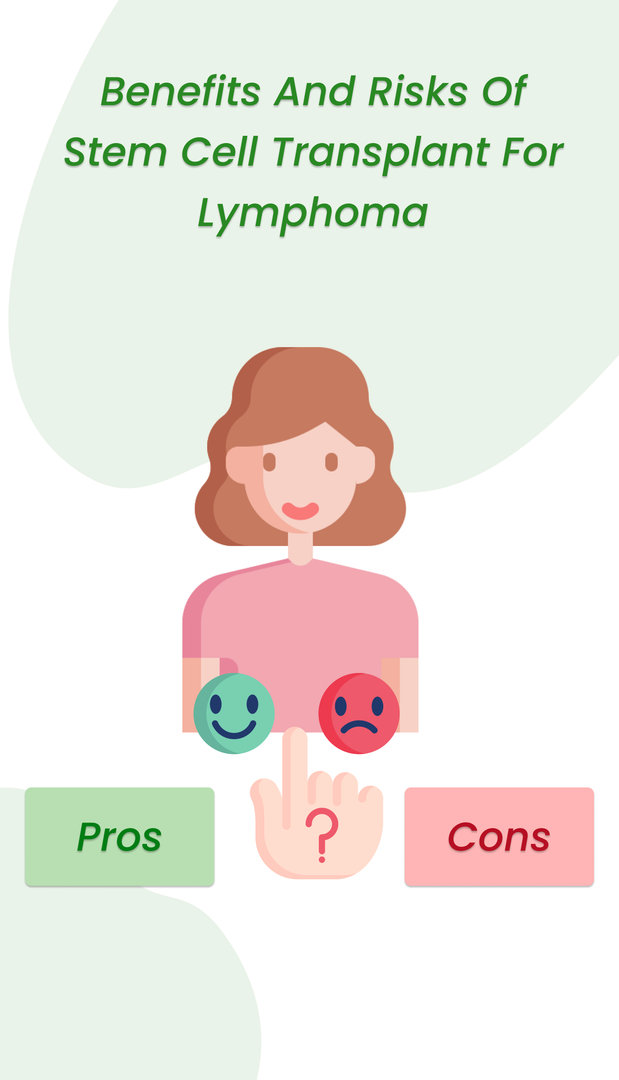
Explore the Benefits and Risks of Stem Cell Transplant for Lymphoma. Take charge of your health and life – contact us today for personalized insights and guidance.
Like every medical procedure, stem cell treatment for lymphoma cancer also has some benefits and risks. While your doctor will explain them to you more fully, we have listed a few of them below.
| Benefits | Risks |
|---|---|
| Longer-lasting remission. | Graft-versus-host disease (if donor cells). |
| Formation of new, healthy cells. | Increased chances of infection. |
| Relatively non-invasive compared to other treatments. | Bleeding during the transplant procedure. |
| Improved survival rates for certain types of lymphoma. | Potential for organ damage. |
| Enhanced quality of life post-treatment. | Possibility of relapse. |
| Reduction in the risk of cancer recurrence. | Complications due to chemotherapy used pre-transplant. |
| Offers treatment options for relapsed/refractory lymphoma. | Long-term side effects, like infertility or secondary cancers. |
Wait, the benefits are not yet over!
Did you know?
It can also help fight lymphoma by recognizing the cancer cells as foreign bodies.
Who is a Good Candidate for Stem Cell Therapy?
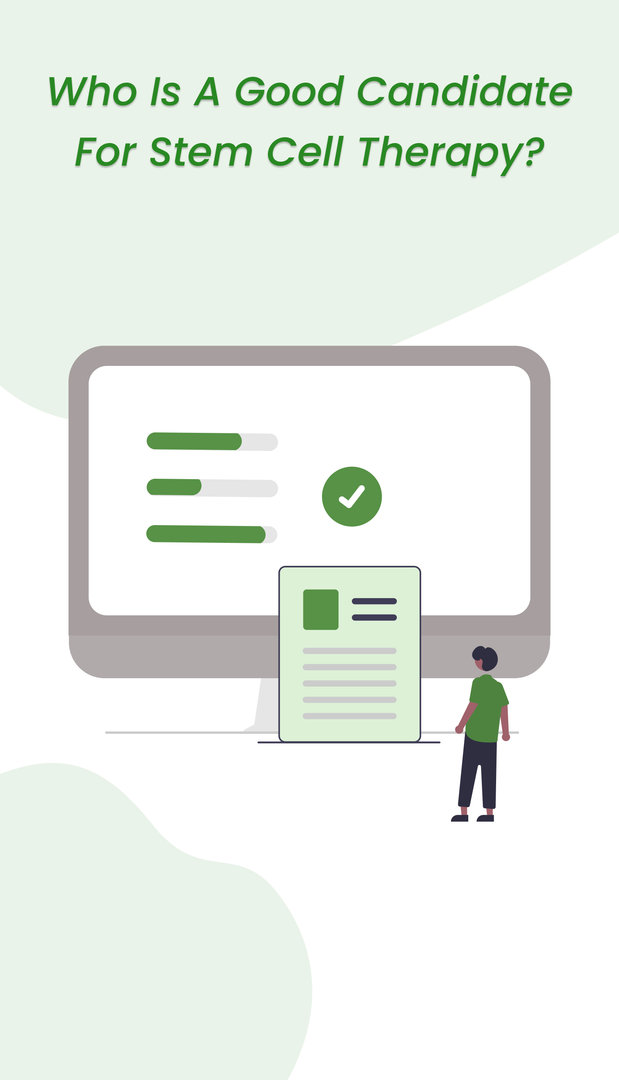
We are sure you’re curious to know if you or your loved one qualifies for stem cell treatment for lymphoma.
You should keep in mind that each clinical trial has its own stringent set of requirements. However, we have made a list of general criteria.
- Age: Younger patients generally respond better to transplants, but older adults can still be eligible based on their overall health.
- Overall Health: Patients must be healthy enough to withstand the transplant process. Conditions like heart or lung issues can impact eligibility.
- Cancer Progression: The stage and aggressiveness of lymphoma determine suitability. Patients with controlled lymphoma may benefit more from a transplant.
- Previous Treatments: Those who haven’t responded to standard treatments may be considered for stem cell transplants.
These criteria help doctors evaluate the risks and potential success of the procedure..
Cost of Stem Cell Transplant for Lymphoma
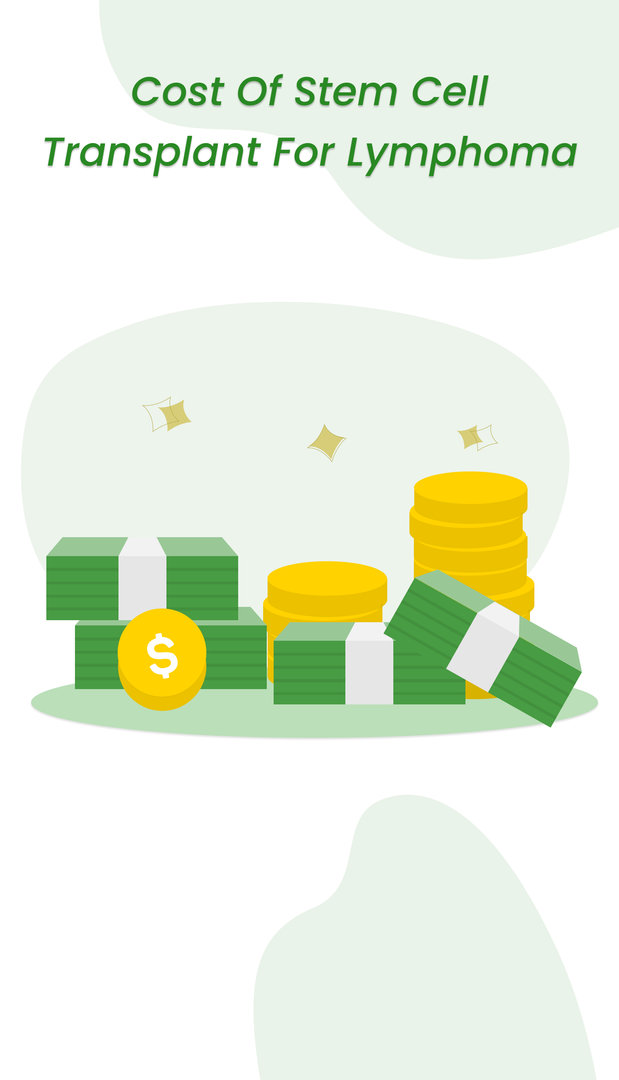
The cost of the stem cell transplant depends on various factors like the number of cycles required, the type of stem cells needed, the kind of facility you choose for your treatment, and the after-care required.
India: The cost ranges between $15,000 to $25,000 (15 lakhs to 20 lakhs INR.) depending on the hospital and type of transplant (autologous or allogeneic). India offers relatively affordable treatment compared to Western countries.
United States: The cost can range from $100,000 to $400,000 or more, making it one of the most expensive places for the procedure.
Other Countries: Countries like Thailand and Turkey offer transplants for around $50,000 to $100,000.
Stem Cell Transplant for Different Types of Lymphoma
How does one know if they should get an autologous or analogous stem cell transplant?
Well, your physician will be the best person to answer this. However, if the stem cells in your bone marrow are already damaged, or if your cancer is too aggressive, an analogous transplant might be your only option.
We have made a list of some common lymphomas and the type of stem cell transplants required for their treatment.
| Lymphoma | Type of Stem Cell Treatment |
|
|
|
|
|
|
|
|
|
|
Stem Cell Transplant Procedure Lymphoma
Want to know more details about the procedure of stem cell replacement for lymphoma?
You’ve come to the right place.
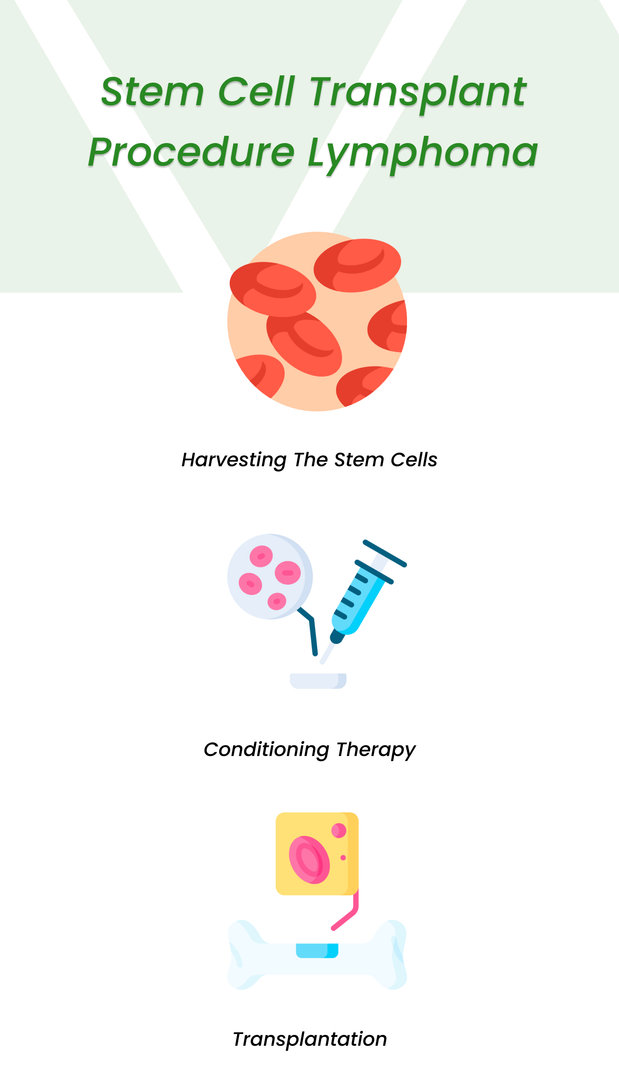
- The first step of stem cell transplant for lymphoma is harvesting the stem cells. About four to five days before the extraction, the patient or the donor is injected with growth factors to increase the number of stem cells.
- The stem cells are generally harvested from the bone marrow of the hip bone, which takes about an hour or two. They are then frozen until required.
- After this, the patient undergoes conditioning therapy. This involves high-dose chemotherapy or radiotherapy. This treatment aims to kill all the cells of the bone marrow, effectively eliminating the cancer cells. The conditioning therapy is done for a week to ten days.
- After waiting for a few days, the patient is ready for transplantation.
- The stem cells are infused into the body intravenously through a central line. This procedure takes a couple of hours.
You will be glad to know that this procedure is completely painless. The stem cells are harvested under local anesthesia to keep the patient or the donor comfortable.
This entire process takes about a month to complete. The duration might be longer if multiple cycles are needed.
Learn about the Stem Cell Transplant Procedure for Lymphoma. Take the first step to recovery – get in touch with us for personalized treatment and support.
What to Expect After Stem Cell Transplant for Lymphoma?
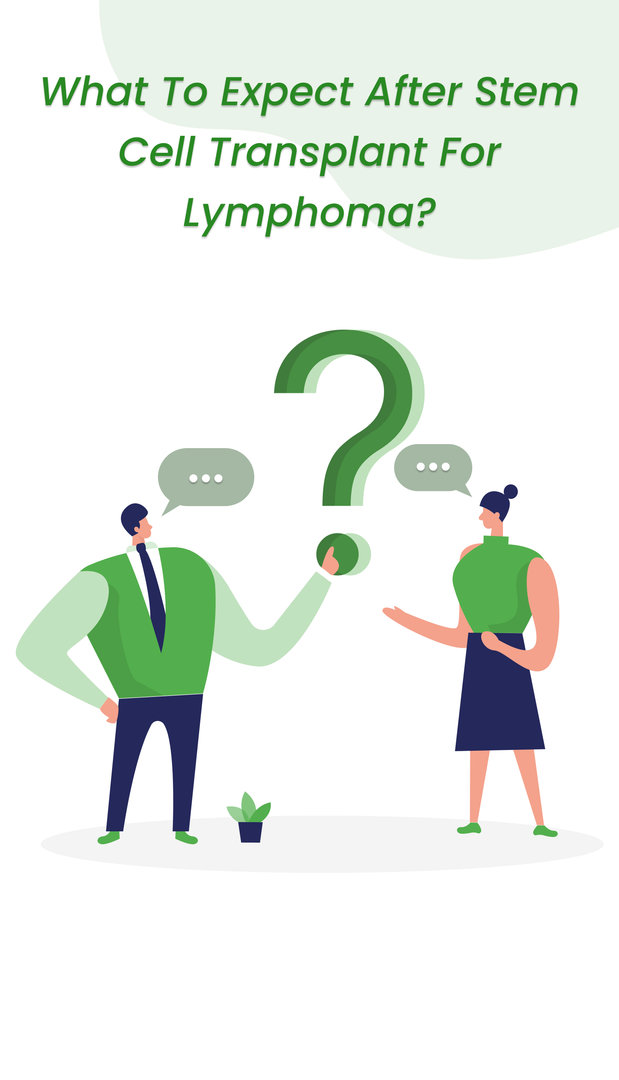
Worried about the side effects of stem cell therapy?
You will experience nausea, vomiting, and dizziness after this treatment, but it’s usually only for a while. The more severe side effects, like mouth sores, are caused by chemotherapy or radiotherapy.
So far, no long-term side effects have been reported in any clinical trials.
The recovery process is a different story, though. It might seem long and arduous, but it’s worth it. You will have to remain in the hospital for the first couple of weeks until your blood count is high enough to fight infections. During this time, you will be kept in a sterile room to protect you from infections.
After your discharge, you will have to continue living in a germ-free environment for a few more weeks. You may resume your daily activities after this period with some precautions. However, you will have to make regular outpatient visits to your doctor for the next six months.
When considering life expectancy after a stem cell transplant for lymphoma, it is often encouraging. Advances in stem cell therapy have significantly improved lymphoma patients' survival rates and life expectancy, providing them with a promising outlook.
Results
Results are visible over the next four to six weeks after treatment when your blood count starts improving. Unfortunately, lymphoma cannot be cured yet. However, in most cases, the patient goes into remission. Many studies are reporting how their patients have been in remission for over six years now.
Stem Cell Transplant for Lymphoma Success Rate
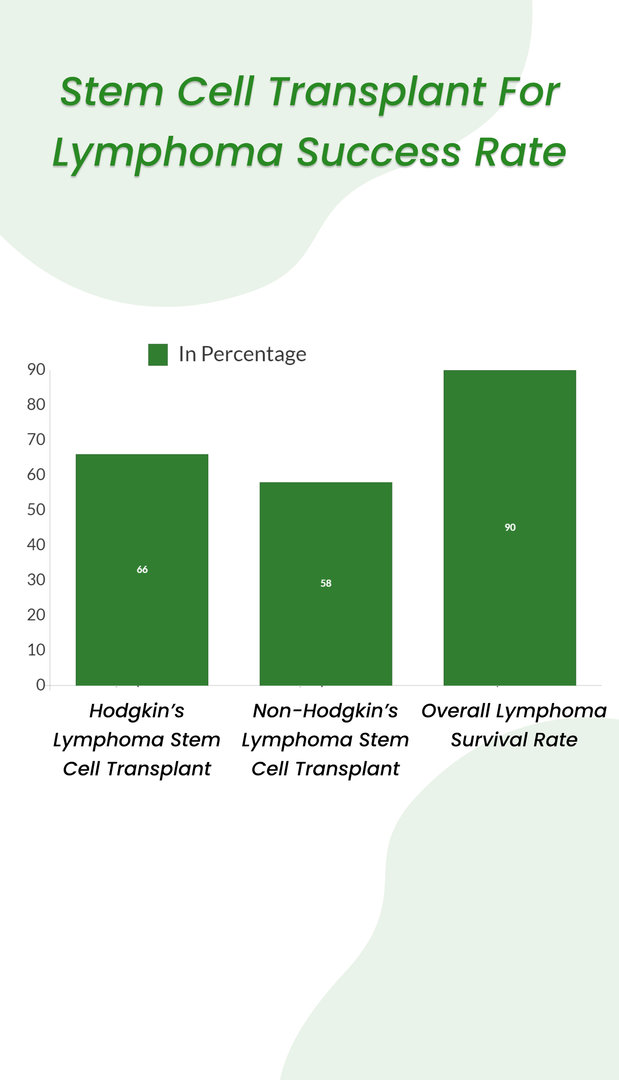
The success rate of stem cell transplant depends on the type of lymphoma treated and how advanced it is.
Hodgkin’s lymphoma stem cell transplant success rate is 66%, with patients surviving for five years or more.
Stem cell transplant non-Hodgkin’s lymphoma success rate is slightly lower at 58%, with patients reported being in remission for eight years.
The survival rate is measured a little differently. It denotes the ability of the patient to survive for five years after treatment. The survival rate of lymphoma patients is 80-90%.
New Research & Advances in Stem Cell Treatments for Lymphoma
- Ongoing Clinical Trials: Researchers are exploring the use of CAR-T cell therapy combined with stem cell transplants, showing promise in enhancing immune system response against lymphoma.
- FDA-Approved Techniques: The FDA recently approved CAR-T cell therapies like Yescarta and Kymriah, which are often used before or after stem cell transplants to improve outcomes in aggressive lymphoma types.
- Innovative Techniques: Studies are focusing on haploidentical transplants, which allow partially matched family members to donate stem cells, expanding donor options for patients.
These developments aim to increase survival rates and reduce relapse.
Support & Recovery After Stem Cell Transplant for Lymphoma:
1. Post-Transplant Care: After the transplant, patients need close monitoring to prevent infections, as the immune system is weak. Regular check-ups, blood tests, and medications ensure the body accepts the new stem cells.
2. Psychological Support: Coping with a stem cell transplant can be emotionally challenging. Patients may experience anxiety, depression, or stress. Counseling and support groups help manage these feelings.
3. Long-Term Monitoring: Even after recovery, patients need long-term follow-ups to track any signs of relapse or complications, ensuring they remain healthy. Regular health checks are key for early detection of issues.
Lymphoma Relapse After Stem Cell Transplant
Lymphoma, unfortunately, is a cancer with a very high relapse rate. However, these rates are lesser after undergoing stem cell therapy.
54% of patients who underwent stem cell therapy for Hodgkin’s lymphoma didn’t relapse for five years after stem cell treatment.
58% of patients who underwent stem cell therapy for non-Hodgkin’s lymphoma didn’t relapse for five years after receiving stem cell treatment.
Facing lymphoma relapse post-Stem Cell Transplant? Your well-being is our priority – call us today to book your appointment and explore tailored solutions for renewed health.
Stem Cell Transplant Lymphoma Success Stories
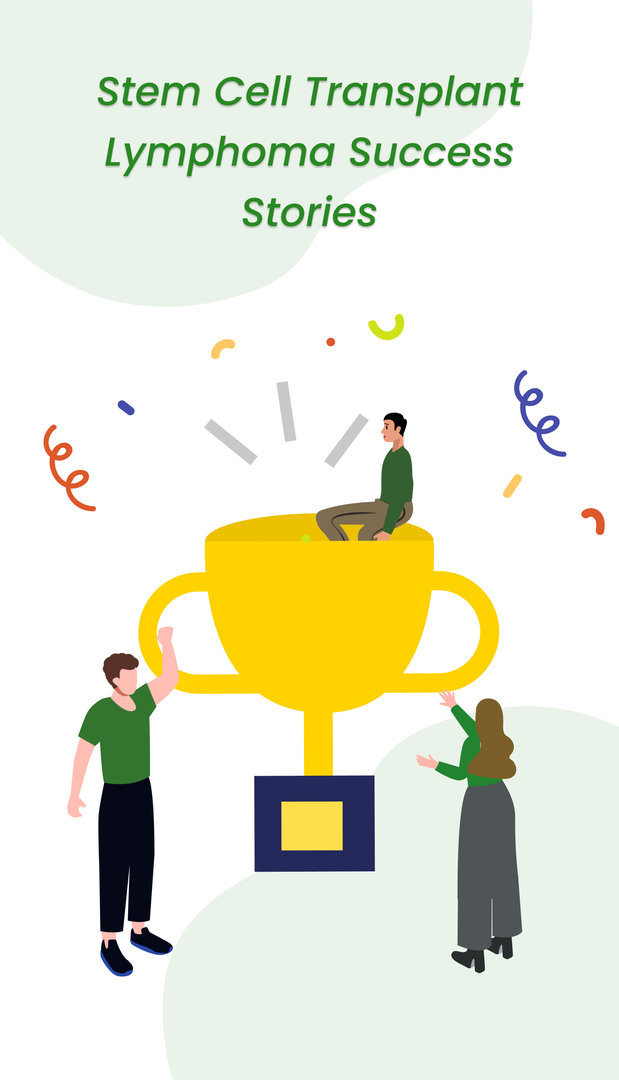
All this information probably sounds quite stark.
Want to hear from someone who underwent Hodgkin’s lymphoma autologous stem cell transplant and lived to tell his tale?
This thirty-nine-year-old (name not released for privacy reasons) was the first person to undergo a stem cell transplant for Hodgkin’s lymphoma in Maharashtra. He had visited several cities, including Chennai, Hyderabad, and Mumbai, before picking Alexis Hospital in Nagpur for his procedure.
A medical oncologist performed his stem cell transplant, Dr. Amol Dongre. He was lucky enough to stay infection-free during his recovery. He was discharged from the hospital after thirty-five days and has remained in remission for four years.
While he knew stem cell transplant was an experimental treatment, he calls it one of his best decisions ever.
What do you think about a stem cell transplant for lymphoma, isn't it quite beneficial?






